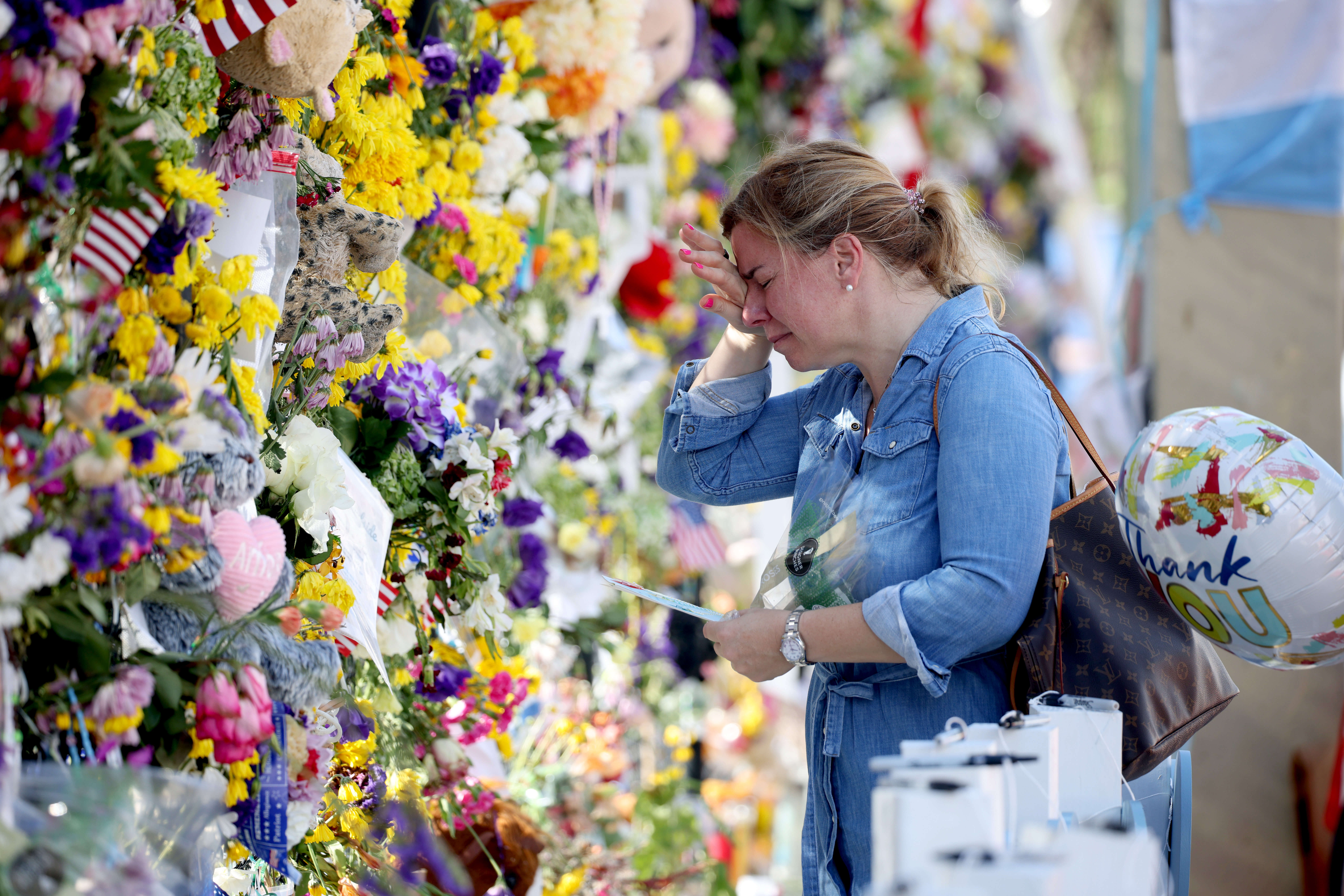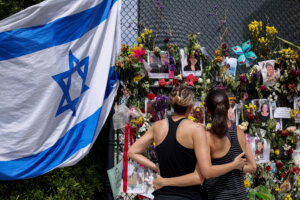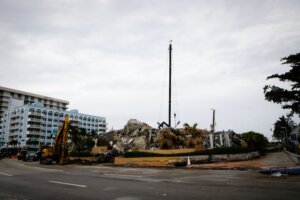On the 2nd anniversary of the Surfside disaster, a first responder finds meaning in her grief
An unusual online minyan offers community and helps mourners with their losses

A visitor weeps as she places flowers near the memorial site for victims of the collapsed 12-story Champlain Towers South condo building on July 8, 2021, in Surfside, Florida. Photo by Anna Moneymaker/Getty Images
The word for house in Hebrew is bayit. As long as a place can hold or contain something — an object, a family or a community — it is bayit. A form of the word turns up in synagogue names like Beth Elohim (“house of God”) or Beth Israel, which also means the people of Israel.

The physical structure of bayit is where we live out our daily lives with our families. We can also find comfort and community when a spiritual space feels like home.
But what happens when that house comes crashing down or when a beloved father, mother, spouse or friend dies? What then? How do we create a home for our grief and our losses? How do we rebuild the place where we find community?
The condo collapse
I live in Miami, just a few miles from Surfside, Florida, where two years ago, on June 24, 2021, a condo building collapsed at 1:24 a.m. When the search and rescue teams were done, they counted 98 people as having lost their lives. The victims ranged in age from 1 to 92.

Since I work part-time as a social worker for Jewish Community Services of South Florida, I was on the first response team. Although I didn’t know any of those who died, I became grief-stricken witnessing the pain the families and survivors were going through.
On the way back to the family information center, I shared a bus with an Indian family. Their son, pregnant daughter-in-law and 1-year-old granddaughter were lost in the rubble. I prayed that the rescue team would find them alive. Tragically, that didn’t happen. With each body found, I felt heaviness in my chest and deep sadness.
But I discovered in those two years that home can be reframed in other ways.
A Zoom minyan
More than two years ago, Rabbi Geela Rayzel Raphael, a Reconstructionist rabbi and leader in the Jewish Renewal movement, needed a place to grieve her mother Natalie. But people weren’t gathering in person at the time due to the pandemic, so she started a minyan on Zoom.
Since its inception, the minyan has attracted clergy, lay leaders and people in mourning who have either just suffered a loss, or whose loved ones are dying. We come together from across denominations: Reform, Conservative, Reconstructionist, Renewal. We meet every evening except Fridays, from institutions and as volunteers, as rabbis, cantors, spiritual leaders and individuals, sharing this online home together.
Friendships have formed between participants living in New Mexico and California. I live in Miami, but I’ve made friends with people living 30 miles away in Fort Lauderdale. I even discovered someone living in Maryland who may be a distant cousin.
Finding meaning in grief
In the book On Death and Dying, Elisabeth Kübler-Ross famously wrote about the five stages of grief: denial, anger, bargaining, depression and acceptance. David Kessler, who co-authored On Grief and Grieving with Kübler-Ross, later wrote another book, Finding Meaning: The Sixth Stage of Grief.
Our minyan has given people a forum for finding that meaning in their losses. While anyone can help with tasks like leading services, managing the Zoom and sharing screens with photos or videos, participants also send private texts of love and support to those who need it. It’s a way for all of us to process sorrow and pain. The strength I have received from these special people, I pass on to my clients.
This July, soon after the second anniversary of the Surfside disaster, many of us who’ve been meeting on Zoom will gather for the first time in person at the Aleph Kallah retreat for Jewish Renewal in Westchester, Pennsylvania. We will bring our spiritual space into a physical structure.
So what is a house? What is home? To me, home is this minyan, with this special group of people, who grieve together, heal together and who have become a family.
For information about this minyan, email Rabbi Raphael at [email protected].






















